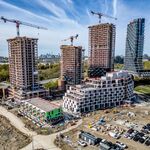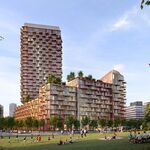The tax thing is a tough issue because it gets political - Miller may very well not lower business taxes this year, because that would have to come with a similar hike in residential property taxes. (Realistically, there will probably be a big hike anyway, and adding an increase to off-set a lower commercial rate would make the bad look worse.) It doesn't matter how good your reasoning is, drastic property tax increase = losing an election.
The thing I'm most interested in is how did Toronto get here in the first place, with low residential property taxes and high commercial tax rates? Does it have something to do with the left-wing development-is-bad mantra of councillors in the 70s and 80s? The Jack Layton types who killed the DRL because it would bring too many people downtown?
You answered your own question in the second paragraph. Council has chosen to do what gets them elected, not do what is right for the long term.
Here is a pretty good history.....
In The Beginning - Before Current Value Assessment
Property was assessed; that is, the municipal government sent out a valuator who examined the property and determined its value. And once a property was assessed, that assessment stood indefinitely. The last assessment before CVA was done in the 1940's. It would probably never change unless you renovated or added to your property. Each year the municipality would figure out how much tax rev. it wanted and then it would set the tax rate - so for example, if the assessor said your property was worth 100,000.00, and the tax rate was set at 1%, you would pay 1% of 100,000.00 i.e. $1,000.00. But when it comes to tax, governments really don't want the taxpayer to understand what is going on, so instead of talking about tax rate, it talks about "mill rate". So, remember, "mill rate" is just another word for tax rate.
This method of property assessment gave stability to the system. If your property was assessed at $100,000.00 in 1956, unless you made changes to it, it would stay at 100,000.00 year after year. You knew that the municipality would change the tax rate from time to time, but you also knew that the rate would rise reasonably slowly, so you always had a good idea of what your taxes would be as years went by. As the City expanded i.e. new homes and buildings were built, they were assessed when built, so the values would be higher than on older properties. So for example a house built at College and Ossington in 1956 might have been assessed at say 30,000, but the identical house built at Finch and Victoria Park in 1966 might be assessed at 40,000. But when you bought that house you knew what the assessment was and you knew with reasonable certainty what your annual tax bill would be. If you thought the taxes were too high or outside your budget, you didn't buy that house, you bought a different house with lower assessment.
This did lead to anomalies. For example, over a long period of time, as market values rose, assessed values stayed the same. So it could well happen that a new, modest-size house at Steeles and Islington might be assessed higher than an large, older home in Rosedale, although the Rosedale home would bring much more money on the market. But the market has a way of straightening out that kind of discrepancy, because the market value of each home reflects in part the annual tax bill. If the taxes on a home are $1,000 a year, a buyer takes that into account when considering what he is prepared to pay for it. If that same home had an annual tax bill of $15,000, he may not be willing to pay nearly so much for that home. So the price of the property reflects in part the level of tax imposed on it. .
----
When the move to CVA was made, in order to insulate (think Rosedale, Forest Hill) the residential property class from dramatic tax hikes a number of policies were adopted. The move to CVA was a wholesale abandonment of the principles of the previous MA and also the new one, being that all classes were to be taxes approximately the same. With the potential for complete financial ruin for many businesses in Toronto, the province enacted some restrictions. The two most relevant would be that, within your property class, the tax rate would be averaged over a period of time. So over a period of time differences between properties in the same class would be removed. The rate at which this could happen is capping. If you were paying less than the class average the city could not raise your taxes (excluding normal budgetary increases) more than a set amount. This was has fluctuated between 2.5 and 5%.
................
http://www.toronto-bia.com/images/stories/taxes/property tax explained.pdf



